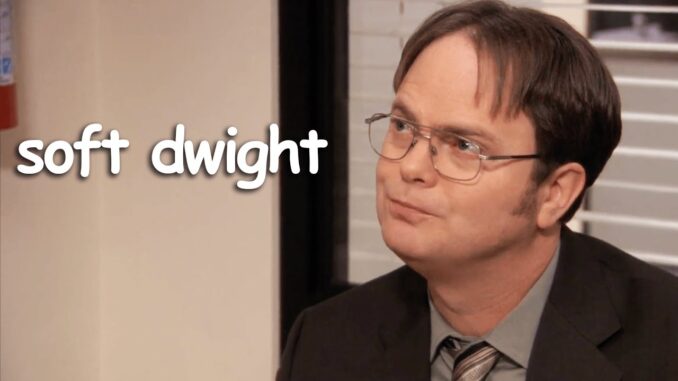
Dwight Schrute, the assistant (to the) regional manager, beet farmer, and self-appointed bastion of logic and order, is not a character often associated with softness. He is a man of protocols and bear attacks, of stern declarations and unyielding pragmatism. His emotional landscape is typically one of ambition, suspicion, and a peculiar brand of aggressive loyalty. To imagine Dwight Schrute being "soft" is to imagine a beet growing a marshmallow heart. Yet, amidst the nine seasons of The Office's mockumentary brilliance, there exists a moment so uncharacteristically tender, so subtly profound, that it stands as the undisputed champion of Dwight's hidden humanity: his quiet validation of Pam Beesly’s art.
The scene unfurls during Pam’s ill-fated art show. It’s a moment of raw vulnerability for her, a hopeful leap into a passion she’s long deferred. She's poured her soul onto canvases, transforming mundane Dunder Mifflin scenes into vibrant interpretations. But the turnout is dismal, the feedback polite but dismissive, and the crushing weight of artistic rejection begins to settle upon her. Her dreams feel flimsy, her talent questioned, and the quiet despair of artistic failure threatens to consume her. In this emotional crucible, Pam’s carefully constructed optimism crumbles, leaving her exposed and tearful.
Enter Dwight. He arrives in his signature, no-nonsense fashion, a lone wolf amidst the sparse crowd. His initial comments are precisely what one would expect from Dwight: critical, analytical, devoid of pleasantries. He assesses the art with a farmer's practical eye, questioning the artistic choices, pointing out perceived flaws with a bluntness that could only belong to him. He critiques a photograph of Angela’s cat, passing judgment with the authority of a seasoned art critic (who has never seen art). For a moment, it seems he will only add to Pam’s misery, perhaps by pointing out the inefficiency of using canvas over, say, laminated beet leaves.
But then, something shifts. His gaze lands on a specific painting: Pam’s unassuming depiction of the Dunder Mifflin office building. It’s not flashy, not avant-garde, but simply a familiar structure seen through Pam’s gentle, observant eye. In a world full of grandiose artistic statements, this painting is quiet, almost humble. Dwight, of all people, stares at it. Perhaps he recognizes the building's stark lines, the familiar brick, the stoicism that mirrors his own. Or perhaps, for a fleeting moment, he sees beyond the physical object to the essence Pam has captured.
And then, he buys it.
The act itself is not a grand gesture. There is no fanfare, no dramatic pronouncement. He simply approaches the sales table, pulls out his wallet, and hands over the money. It's a transactional act, but the meaning behind it reverberates far beyond the simple exchange of currency. It’s a validation, a tangible declaration that her art has value, that her effort is seen. Pam, still reeling from her disappointment, can barely comprehend it.
What follows is Dwight’s softest soliloquy. "Do you like it?" Pam asks, bewildered. Dwight, looking at the painting he now owns, responds with a quiet certainty, "Yeah. I do. There's a lot of beauty in ordinary things. Isn't that kind of the point?" He then goes on to offer a uniquely Dwight-ian critique, yet it transforms into the most profound encouragement she receives that night: "Your art was the prettiest art of all the art." This is not a man comfortable with sentiment, yet his words, delivered with his characteristic earnestness, cut through the noise of superficial praise and polite dismissal. He doesn't say "good job" or "I believe in you." He offers something far more personal and honest, filtered through his own peculiar lens of observation. And then, as he leaves, the final, understated instruction: "Don't ever give up."
This moment embodies Dwight’s deepest softness because it is utterly devoid of self-interest or manipulation. It is not an act for the camera, nor a bid for approval. It is a genuine, unprompted recognition of another person’s struggle and a quiet, practical act of support. He doesn't coddle Pam; he doesn't even offer conventional comfort. Instead, he sees her talent, affirms her unique perspective, and provides the most valuable gift an aspiring artist can receive: belief, made manifest in a purchase and a few simple, profound words. He takes the painting, later hanging it proudly next to his desk at Dunder Mifflin, a permanent testament to his unexpected capacity for empathy.
In a character often defined by his abrasive edges, his rigid adherence to rules, and his often-comical social awkwardness, this scene reveals a hidden spring of profound kindness. The softest Dwight Schrute moment is not a tearful confession or a grand declaration of love. It is the understated, deeply authentic act of seeing someone in their vulnerability, affirming their worth, and urging them, in his own inimitable way, to never give up. It is the quiet humanity beneath the beet farmer's gruff exterior, blooming unexpectedly, like a rare, delicate flower in the most unlikely of fields.
@scottstoots_ he didn’t have to stay there, but he did anyway. #dwightschrute #pambeesly #theofficeus #theoffice #theofficeedit #fyp #foryoupage
